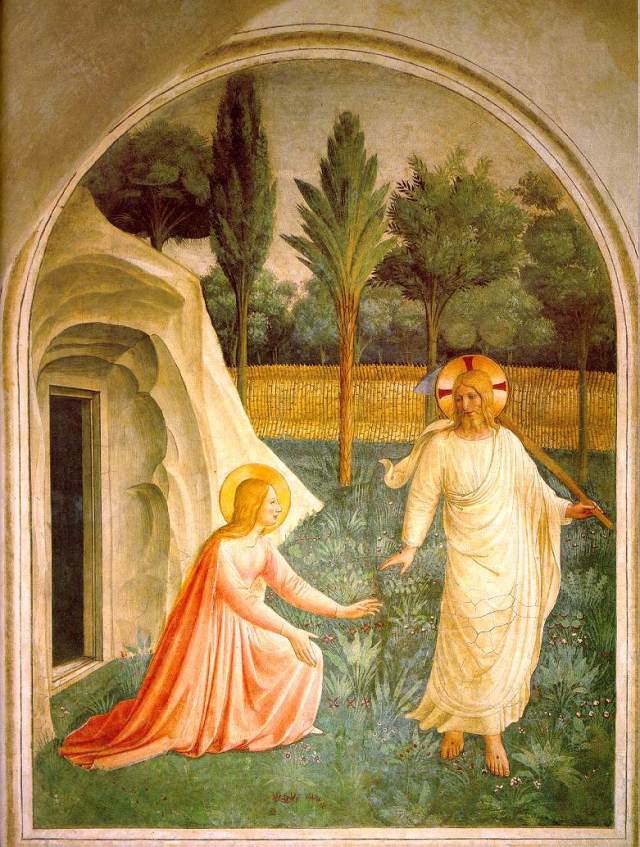 Noli me Tangere by Fra Angelico
Noli me Tangere by Fra Angelico
“Noli me Tangere”.
These famous words here in Latin spoken by Jesus to Mary Magdalene after His Resurrection can be translated into English as ‘don’t touch me’ or ‘touch me not’. But the original phrase, written in Greek, might be better translated as ‘cease holding on to me’ or ‘stop clinging to me’.
But there are numerous accounts in the Gospels of Christ touching people when He healed or blessed them. When a leper came to Him, Jesus stretched out His hand and touched him (Mark 1:40-45); Jesus felt the power leave Him when a woman, believing Jesus could heal her, touched the hem of His garment (Luke 8:47-49); He touched and healed a man who had been blind from birth (John 9:1-20). Soon after the incident with Mary Magdalene at the open tomb we have John’s vivid description of the Apostle Thomas, who doubted before seeing the resurrected Lord, placing his fingers in the wounds of Christ’s hands and side (John 20:24-29)
And we too as human beings use the sense of touch all the time as signs to show our feelings and give meaning to our actions. We shake hands as a sign of friendship; touch is very important in the relationship between a husband and wife; we cuddle and kiss our babies and children as a way of demonstrating our love; when we hold the hand of someone who is suffering or dying, we give comfort and dispel fear and loneliness. Through many of the sacraments (viz. Baptism, Confirmation, Holy Orders, Anointing of the Sick) God touches us.
So why did Jesus tell Mary Magdalene not to hold on to Him? What was He trying to convey to her? Wouldn’t we have done the same under the circumstances? If we had thought someone we loved deeply was lost forever – even finding the body removed from the tomb – wouldn’t we too weep helplessly? Through her tears Mary sees a figure who asks her why she weeps, and mistaking him for the gardener she begs him that, if he has taken the body, to tell her where he has lain it so she can recover it. To then hear the beloved voice pronounce her name and find Him standing before her, surely our reaction of overwhelming joy and amazement would be the same, and we would fling ourselves forwards to embrace Him. We wouldn’t let him go.
In the New Revised Standard Version, John 20:17 reads, “Jesus said to her, ‘Do not hold on to me, because I have not yet ascended to the Father…’.” Although Jesus’s words could be interpreted as referring to cleanliness or appropriate behaviour, what follows is the key to understanding the real meaning: ‘…..but go to my brethren, and say unto them, I ascend unto my Father, and your Father; and to my God, and your God.’
The time is over now for Jesus’s earthly walk among His Apostles and disciples when they would cling to their Master for all their needs. He will no longer walk with them in the flesh, but He will not leave them orphans. They have the promise of the Holy Spirit, the love of God in their hearts will fire them up with courage and inspiration; an outpouring of grace and blessing.
Jesus tells Mary Magdalene not to cling on to Him, but to go immediately and tell the others the Good News. Jesus, Son of God, the Way, the Truth and the Life is risen from the dead, and when He ascends to His Father in Heaven we have His word that we have a place prepared for us too at the heavenly banquet. We shall see the Beatific Vision; we shall be reunited with our loved ones who have gone before us. No matter what suffering awaits us on earth, we need never despair. That is the message for us too: we must not stay clinging just to the miraculous event of Christ’s Resurrection and leave it at that, without transforming our lives. No, we must go forth as Jesus tells us, and under the guidance of the Holy Catholic Church, the Pope and Magisterium, we must spread the word of all that we have ‘seen and heard’ with our joy, our hope, our love, our forgiveness…… With the whole of our lives.
‘O death, where is your sting?
O Hades, where is your victory?
Christ is risen and the tomb is
emptied of the dead; for Christ,
being risen from the dead, has
become the leader and reviver
of those who had fallen asleep.
To him be glory and power for
ever and ever’ (St. John Chrysostom)






A beautiful post, Kathleen
LikeLike
An inspiring post, thank you.
LikeLike
Thanks from me too for this lovely reflection, Kathleen.
LikeLike
Reblogged this on Catholicism Pure & Simple and commented:
Re-blogging this post from April 2011.
LikeLike
Thanks Kathleen….. The last sentence however sounds like proselytising to me. Aint that supposed to be just pious nonsense?……..
LikeLike
@ Geoff
Oh dear! Does that mean I’ll have those P.C. guardians-of-‘holy’-secularism coming after me? 😉
LikeLike
Pingback: St. Mary Magdalene | Letters from the Anchorhold